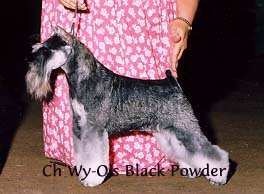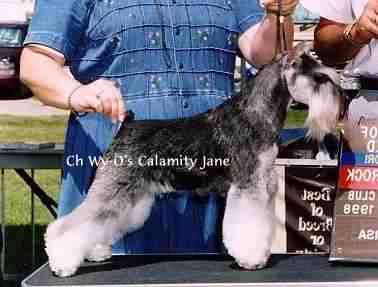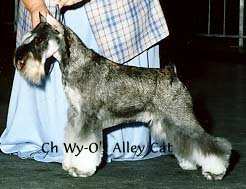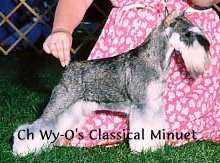Wy-O's
Miniature
Schnauzers
Show
Dogs, Dog Shows
Showing
dogs is fun! Dog shows are another way to interact with your dog, they
are a competitive sport, a proving ground of knowledge and skill, a way
to show off your breeding program, a new circle of friends you'd never
meet any other way, and probably a hundred other reasons that suit each
person involved. But if it isn't fun, why would you want to show dogs????

For
an AKC conformation show, the first requirement is a purebred dog registered
with the American Kennel Club. As with any sport, winning is more fun than
losing, so you can improve your chances by looking for the best quality
dog that you can find and that you can afford.
If
you are just beginning, your best move is to take the time to find a reputable,
successful breeder. Take your time. These people will be the ones whose
names you hear mentioned most often while you are searching for your dog.
They will be proving their competence by the success of dogs they have
bred, either exhibiting the dogs themselves or having a professional handler
show them (more about that later). They will be the ones who answer your
questions, acting as long term mentors that will save you any number of
mistakes along the way. A caring breeder will be asking you questions too,
to find out your goals and intentions, and something as seemingly simple
as whether a Miniature Schnauzer is right for you.
The
breeder may sell a puppy with "strings", or conditions, a more complicated
arrangement than a straight-forward sale. Possible stipulations include
co-ownership agreements, promises to have the dog shown a certain number
of times or by a certain handler, or perhaps an arrangement to return a
puppy from a future breeding. Be sure you understand these conditions,
and can live up to them, before you sign the contract. As appealing
as young puppies are, they are only potential show quality. Until
a puppy has grown enough to predict size accurately, has gotten his adult teeth,
perhaps grown through the gawky stage to more mature structure,
it just isn't possible to guarantee show quality -- a puppy might easily
be 6 or 8 months before a judgement can be relatively certain.
Two
options mentioned earlier for showing a dog - either a professional handler
or exhibiting your dog yourself. Dogs shows are unique in that amateurs
and professionals compete on equal terms in the show ring. The amateur
must try hard to equal a professional's expertise, but has the advantage
of concentrating all his efforts on his own dog.
 If
you show your dog yourself:
If
you show your dog yourself:
1. You must have a good dog.
2. Study the breed standard
- really read to understand it, don't just listen to bits quoted by others. Compare
your dog to the Illustrated Discussion drawings - available from the American
Miniature Schnauzer Club. Learn your dog's strengths and weaknesses.
If you don't start learning to evaluate knowledgeably, how can you ever
improve?
3. Talk to successful exhibitors.
Most will take the time to talk to you if you seem serious and chose the
right time, i.e. wait until they are done showing for the day. Try to listen
more than you talk. :-)
4. Learn to groom and condition
your Schnauzer according to accepted show standards. For Miniature Schnauzers,
this is no small requirement, and will take time and practice to learn.
This is another benefit your mentor can provide. Here is one website with
directions.
5. Go to shows and matches,
watch how things work. Start learning all the unwritten rules of dog shows.
Consider joining an all-breed kennel club in your area, and a regional
Miniature Schnauzer club if one is available.
6. Attend as many handling
seminars as become available in your area. We all start as rank beginners,
we've all embarrassed ourselves - just get started! It really can
help to have a friend video you and your dog in the ring, so that you watch
and critique yourself later.
7. Travel to national and
regional specialties to see a larger gathering of Miniature Schnauzers.
Subscribe to the breed magazine -- Schnauzer Shorts PO Drawer A,
La Honda, CA 94020. This will help develop your "eye" for the breed, awareness
of the finer distinctions in type and quality.
8. Learn to evaluate your
own dog and your competition honestly. If you are losing consistently,
tuck your hurt feelings in your pocket, and start finding out why. Is your
dog too young? Out of condition or poorly groomed? Do you need to improve
your handling skills? Here's the tough one - is your dog just not as good
as the competition? Blaming others for your losses is a sure sign that
you have taken the easy way out -- and at that rate, you will never "make
it".
Cost: entry fees, your time,
travel expenses - gas, van or motorhome? motel? meals? missed work?
 If
you use a professional handler:
If
you use a professional handler:
1. You must have a good dog.
2. Investigate the handler
carefully. This is someone you are trusting with the life of your dog.
How will your dog live while in their possession? Does the handler have
kennel help? What seems to be these people's attitude towards the dogs?
Observe them several times before approaching the handler. Talk to some
of their clients. Is this handler experienced and successful with Miniature
Schnauzers?
3. AKC has begun licensing
handlers again, and there is also a PHA - Professional Handlers Association
- that offer some assurance.
4. Ask the handler to appraise
your dog and it's chance of success. Honesty is crucial. This is not the
time to be shy about money - and overinflated promises could cause a serious
waste of your money. Expect a written contract with your handler and itemized
expenses. Is your dog the only Min Schnauzer the handler is showing? How
many more Schnauzers or other Terriers? What priority will your dog have
- at the Class level, the Breed level, the Group level? Who will groom
and show your dog? Make sure you understand exactly.
5. An honest, experienced,
successful handler will be able to present your dog well, providing maximum
chance of success. A handler will go to more shows than you can, providing
more chances of success.
6. The dog may finish it's
Championship sooner with the handler than with you as a beginning exhibitor.
Depending on circumstances, it might or might not be cheaper too.
7. A good handler can be the
answer for someone who lacks experience, knowledge, or the ability to travel.
8. The same cautions apply
-- if your dog isn't winning after 10 shows, stop until you find out why
not.
Cost: entry fee, handler fee(s)
which may include shipping, grooming, board, a portion of travel expenses
in addition to the actual handling fee.
 If
you don't have a mentor:
If
you don't have a mentor:
Look
for help and information in different ways. You can gather information
from many different sources in the dog world, not necessarily just other
Schnauzer people.
We
didn't gain mentors when buying our first Schnauzers. By searching, we
found a good handler who taught us, and gradually transferred grooming
duties to us while showing and finishing our first dogs' Championships.
During this time, we joined our local kennel club, took handling classes,
and eventually felt we were ready to try this ourselves. I made clever
mistakes like messing up show coats, dropping my dog's leash in the ring,
telegraphing my nerves to the dogs, and making innumerable handling goofs.
But we stuck with it, and I can't tell you how proud we were the first
time we handled our own dog to her Championship.
We
also found help from breeders whose stud dogs we had used. We appreciated
hearing a more experienced breeder evaluate puppies, and other times, we
learned grooming techniques. These people have an interest in quality puppies
produced by their stud dog, and in encouraging their show success.
Random thoughts:
Miniature
Schnauzers are shown in conformation shows with a stripped coat. A Schnauzer's
body coat is never clippered from the time it is a puppy until it's show
career is finished. When done carefully and correctly, stripping is not
painful for the dog, but this is another time to use a mentor's expertise.
Obedience, agility, or tracking dogs may be shown with a clippered body
coat.
A
Miniature Schnauzer may be shown with uncropped or cropped ears. Either
way, ears greatly affect the "look" of a Schnauzer. Uncropped ears must
be set well on the head, and of correct size - ears are not necessarily
going to turn out well just because they are "natural". Most MS are shown
with cropped ears, and judges are more accustomed to seeing them cropped.
Before
having a puppy's ears done, be sure the veterinarian knows what he is doing
- not all ear crops are equal.
We
are a community of friends and acquaintances with Miniature Schnauzers
in common, but consider the competitive element before you expect someone
to give you and a rival puppy full effort. It is just human nature that
your own breeder/mentor will care more about helping you with your puppy
than will anyone else.
But
back to the beginning, if you aren't having fun, why would you want to
show dogs????

Resources
American Miniature
Schnauzer
Club pages & publications. http://www.amsc.us/
AKC has information about
dog shows and how they work:
http://www.akc.org/events/conformation/beginners.cfm
They have more pages too,
about getting involved in the different events: http://www.akc.org/events
An excellent article about Miniature Schnauzer
type: http://www.katewerk.com/type.html
Another on show grooming: http://www.katewerk.com/trim.html
On to: Cataracts
in Schnauzers . . or . . LINKS
. . . or back to . . Wy-O's
Front Page
Email us -- clouss (at) wy-os.net
©Copyright 1999
- 2013 Wyoma Clouss: All rights reserved for photos, background, and written
material.
You may not copy or re-use any material on these pages without my express
written permission.

 If
you show your dog yourself:
If
you show your dog yourself:
 If
you use a professional handler:
If
you use a professional handler:
 If
you don't have a mentor:
If
you don't have a mentor:
